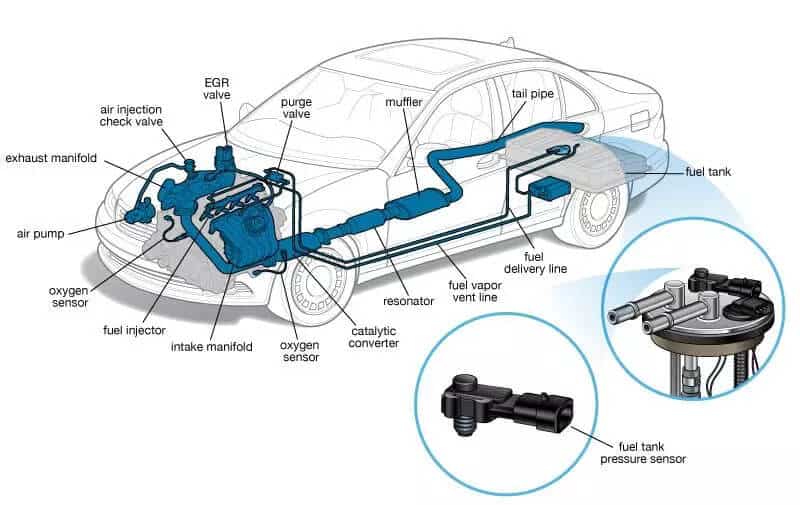Are you experiencing fuel gauge issues? Does your car’s fuel level seem to fluctuate for no apparent reason? It’s possible that your fuel level sensor is faulty. In this article, we’ll explore what a fuel level sensor is, how much it will cost to replace it in Canada, and how to keep it in good working condition.
What is a Fuel Level Sensor?
A fuel level sensor is a device that is used to measure the amount of fuel in a vehicle’s gas tank. It sends a signal to the car’s fuel gauge to let the driver know how much fuel is left in the tank.

How Much Will it Cost to Replace a Fuel Level Sensor in Canada?
The cost of replacing a fuel level sensor in Canada can vary depending on the make and model of your vehicle, as well as the location of the repair shop. On average, you can expect to pay between $200 and $400 for parts and labor. The labor time required for this job is usually around 1 to 2 hours.
What are the Symptoms of a Faulty Fuel Level Sensor?
The symptoms of a faulty fuel level sensor can vary, but some common signs include:
1. Inaccurate fuel gauge readings: The fuel gauge may display incorrect or inconsistent fuel levels, making it difficult to determine the actual amount of fuel remaining in the tank.
2. Erratic fuel gauge behavior: The fuel gauge may fluctuate rapidly, show a full or empty tank constantly, or not respond to changes in fuel level.
3. Fuel light remains on: The low fuel warning light may stay illuminated, even when there is an adequate amount of fuel in the tank.
4. Check engine light: A faulty fuel level sensor can trigger the check engine light, indicating a problem with the sensor or related systems.
5. Poor engine performance: Inaccurate fuel level data can cause the vehicle’s computer to make incorrect adjustments to fuel delivery and pressure, leading to reduced engine performance and efficiency.
6. Unexpected fuel shortages: A malfunctioning fuel level sensor can cause drivers to misjudge the remaining fuel, leading to unexpected fuel shortages and the risk of running out of gas.
How Long Does a Fuel Level Sensor Last?
A fuel level sensor can last for many years, but it can become defective over time due to wear and tear.
How does a Fuel Level Sensor Become Defective?
A fuel level sensor can become defective due to several factors, including:
1. Wear and tear: Over time, the fuel level sensor can wear out or degrade due to constant exposure to fuel and changing temperatures within the tank.
2. Contamination: Dirt, debris, or sediment buildup in the fuel tank can accumulate on the sensor, impairing its ability to provide accurate readings.
3. Corrosion: Moisture and contaminants within the fuel tank can cause corrosion of the sensor components, leading to a loss of functionality.
4. Electrical issues: Wiring or connection problems, such as damaged wires, corroded connections, or loose connectors, can result in intermittent or complete loss of signal from the fuel level sensor to the vehicle’s computer.
5. Damage from external factors: The fuel level sensor’s location within the fuel tank makes it susceptible to damage from external factors such as collisions, extreme temperature fluctuations, or exposure to harsh chemicals.
6. Manufacturing defects: In some cases, a sensor may have inherent manufacturing defects that cause it to fail prematurely. Replacing the faulty sensor with a high-quality component can help ensure reliable performance.
How A Faulty Fuel Level Sensor can affect other systems in the car?
• Inaccurate fuel gauge readings: A malfunctioning fuel level sensor can lead to incorrect fuel gauge readings, causing confusion and potentially leading to unexpected fuel shortages.
• Impact on emissions control system: A faulty fuel level sensor can negatively affect the vehicle’s evaporative emissions control system (EVAP), resulting in increased emissions and environmental impact.
• Check engine light: A malfunctioning fuel level sensor may trigger the check engine light, causing concern for the driver and potentially indicating issues with related systems.
• Fuel system performance: Inaccurate fuel level data may cause the vehicle’s computer to make incorrect adjustments to fuel delivery and pressure, impacting overall engine performance and efficiency.
Is it Safe to Drive with a Faulty Fuel Level Sensor?
Driving with a faulty fuel level sensor is generally not considered dangerous, but it can pose certain risks and inconveniences. A malfunctioning fuel level sensor can result in inaccurate fuel gauge readings, making it challenging to determine the actual amount of fuel remaining in the tank. This can lead to the unpleasant surprise of running out of gas unexpectedly, leaving you stranded on the side of the road or in an unsafe location.
Additionally, a faulty fuel level sensor can impact the proper functioning of your vehicle’s emissions control system, as previously mentioned. While this issue may not directly affect the safety of driving the vehicle, it can contribute to increased emissions, which can have negative environmental consequences. In some cases, a malfunctioning fuel level sensor may even trigger the check engine light, which can be a source of confusion and concern for drivers.
In conclusion, while it may not be inherently dangerous to drive with a faulty fuel level sensor, doing so can result in inconveniences and potential roadside emergencies due to an unexpected lack of fuel. To avoid these situations and maintain the overall reliability and safety of your vehicle, it is recommended to address any fuel level sensor issues promptly.

How Can I Make My Fuel Level Sensor Last Longer?
Here are some tips to keep your fuel level sensor in good working condition:
• Avoid overfilling your gas tank
• Keep your gas tank clean and free of dirt and debris
• Have your fuel system inspected regularly by a qualified mechanic
• Use quality fuel to prevent contamination
Conclusion
A faulty fuel level sensor can cause a variety of problems, including inaccurate fuel readings and running out of gas unexpectedly. If you’re experiencing fuel gauge issues, it’s important to have your fuel level sensor checked by a qualified mechanic. By following the tips outlined in this article, you can help ensure that your fuel level sensor lasts as long as possible.
Next Steps
Book Your Fuel Level Sensor Replacement (Fuel Pump) Service
The service most frequently booked by those who read this article is Fuel Level Sensor Replacement (Fuel Pump). Uchanics’ expert technicians make the process even more convenient by bringing the service right to your doorstep. We perform this job at your home or office, covering over 40 cities in Ontario, including Oshawa, Ajax, Toronto, Scarborough, Mississauga, Brampton, and more. Our commitment to excellence has earned us more than 700 glowing 5-star reviews. Choose Uchanics for your Fuel Level Sensor Replacement (Fuel Pump) and experience unparalleled convenience and top-quality service.
